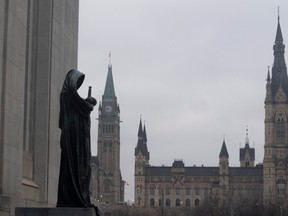Article content
The announcement last month of a coalition between the minority Liberals and the NDP gave Canadians something no one voted for: the implementation of NDP policies under a Liberal banner.

A Chamber of Citizen Representatives would help de-politicize government
The announcement last month of a coalition between the minority Liberals and the NDP gave Canadians something no one voted for: the implementation of NDP policies under a Liberal banner.
It’s another example of how party politics takes precedence over good government and sound decision-making. Our country is driven primarily by partisan concerns and short-term political decision-making — much to the detriment of average Canadians.
Could we rein in partisan politics and depoliticize the management of the country?
I believe we could, and the government reform I would propose would be the creation of a new Chamber of Citizen Representatives — non-partisan, democratically elected citizens who could provide a healthy counterbalance to the power of political parties and who would have a say in determining the policies and regulations that govern our country.
Here’s how it would work:
Citizen Representatives would represent voters from three existing electoral districts, or ridings, currently in place to elect members of Parliament. In other words, three ridings would be combined into one for the purpose of electing a Citizen Representative. As a result, there would be one Citizen Representative for every three MPs.
Anyone wishing to run for the Chamber of Citizen Representatives would have to be a minimum of 40 years of age and would need to obtain a minimum of 300 signatures from fellow citizens within their district endorsing their candidacy. Harvesting signatures from members of large organizations would not be permitted in order to ensure that the Citizen Representative candidate was not beholden to a special interest group or association. Citizen Representative candidates would be everyday citizens from all walks of life and backgrounds with practical, real-world experience and a deep-seated concern for the well-being of their country.
The candidates would issue a one-page résumé profiling their backgrounds and work experience to all of the voters within the district. Candidates would also make themselves available for debates at town hall meetings. There would be no advertising allowed on the part of the Citizen Representative candidates, and all election-related expenses would be covered by the government. After having served one full term, the Citizen Representatives would return to private life.
Instead of merely rubber-stamping legislation passed by the House of Commons, like the current Senate, the Chamber of Citizen Representatives would have a significant say in approving all legislation. Citizen Representatives would vote on all bills brought before the House and would cast their votes at the same time, and the two separate sets of votes would then be added together. A simple majority of votes would be required to pass a bill. However, unlike the MPs in the House, Citizen Representatives would vote by way of secret ballot. This would insulate them from any personal inducements or reprisals they might be subjected to if their votes were made public.
A lot of people I’ve discussed this idea with have been supportive but skeptical that it could ever come about. The truth is, reforming government along the lines I’ve suggested would be possible — although difficult — if there was enough public support and political will.
Various statesmen and political leaders in English-speaking democracies have advocated similar measures. Former British prime minister Winston Churchill at one time argued for the creation of a non-political body or chamber because he believed that elected politicians would always put their own short-term political interests ahead of the long-term economic interests of the country.
By introducing Citizen Representatives, we could re-democratize our system of government and bring back the voice of the citizen in governing our national affairs. We could finally do away with the Senate, which has become a toothless chamber filled with political appointees. And we’d also be able to rein in the power of political parties and inject some of the common-sense views that you’re more likely to hear in Canada’s coffee shops, taxi cabs and farmers’ markets than in Canadian Parliament.
The views of Citizen Representatives would reflect, to a much greater degree, the views of Main Street Canada. With Citizen Representatives, we could begin to claw back some of the power and control wielded by the professional political class that runs the governments of most Western democracies today.
Ultimately, with Citizen Representatives, we’d make our government much more effective and accountable — and who wouldn’t vote for that?
Frank Stronach is the founder of Magna International Inc., one of Canada’s largest global companies, and an inductee in the Automotive Hall of Fame. He can reached at fstronachpost@gmail.com
National Post

OTTAWA – Prime Minister Justin Trudeau says the NDP is caving to political pressure from Conservative Leader Pierre Poilievre when it comes to their stance on the consumer carbon price.
Trudeau says he believes Jagmeet Singh and the NDP care about the environment, but it’s “increasingly obvious” that they have “no idea” what to do about climate change.
On Thursday, Singh said the NDP is working on a plan that wouldn’t put the burden of fighting climate change on the backs of workers, but wouldn’t say if that plan would include a consumer carbon price.
Singh’s noncommittal position comes as the NDP tries to frame itself as a credible alternative to the Conservatives in the next federal election.
Poilievre responded to that by releasing a video, pointing out that the NDP has voted time and again in favour of the Liberals’ carbon price.
British Columbia Premier David Eby also changed his tune on Thursday, promising that a re-elected NDP government would scrap the long-standing carbon tax and shift the burden to “big polluters,” if the federal government dropped its requirements.
This report by The Canadian Press was first published Sept. 13, 2024.
The Canadian Press. All rights reserved.

Quebec wants to curb excessive tipping.
Simon Jolin-Barrette, minister responsible for consumer protection, has tabled a bill to force merchants to calculate tips based on the price before tax.
That means on a restaurant bill of $100, suggested tips would be calculated based on $100, not on $114.98 after provincial and federal sales taxes are added.
The bill would also increase the rebate offered to consumers when the price of an item at the cash register is higher than the shelf price, to $15 from $10.
And it would force grocery stores offering a discounted price for several items to clearly list the unit price as well.
Businesses would also have to indicate whether taxes will be added to the price of food products.
This report by The Canadian Press was first published Sept. 12, 2024.
The Canadian Press. All rights reserved.

Quebec legislature member Youri Chassin has announced he’s leaving the Coalition Avenir Québec government to sit as an Independent.
He announced the decision shortly after writing an open letter criticizing Premier François Legault’s government for abandoning its principles of smaller government.
In the letter published in Le Journal de Montréal and Le Journal de Québec, Chassin accused the party of falling back on what he called the old formula of throwing money at problems instead of looking to do things differently.
Chassin says public services are more fragile than ever, despite rising spending that pushed the province to a record $11-billion deficit projected in the last budget.
He is the second CAQ member to leave the party in a little more than one week, after economy and energy minister Pierre Fitzgibbon announced Sept. 4 he would leave because he lost motivation to do his job.
Chassin says he has no intention of joining another party and will instead sit as an Independent until the end of his term.
He has represented the Saint-Jérôme riding since the CAQ rose to power in 2018, but has not served in cabinet.
This report by The Canadian Press was first published Sept. 12, 2024.
The Canadian Press. All rights reserved.


Looking for the next mystery bestseller? This crime bookstore can solve the case


TIFF audience prizes for ‘Life of Chuck,’ Hip doc; Rankin among Canadian winners


Nova Scotia premier repeats calls for Ottawa to pay for protecting Chignecto Isthmus


Emir of Qatar to visit Ottawa on what will be his first official trip to Canada


Labour Minister praises Air Canada, pilots union for avoiding disruptive strike


Halifax library workers accept deal to end strike, branches to re-open Thursday


Air Canada deal avoids shutdown, brings relief to passengers and business groups


Slovenia’s Tadej Pogacar wins Grand Prix Cycliste de Montreal